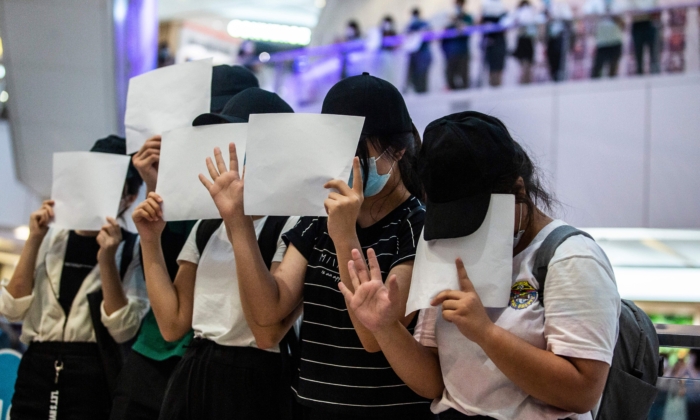FBI Director: One New China-Related Investigation Is Opened Every 10 Hours
The White House remained silent as of July 7 about whether President Donald Trump would sign the veto-proof bill authorizing the U.S. government to sanction a broad range of people and entities tied to the Chinese Communist Party’s de facto takeover of Hong Kong.
The House and Senate passed the Hong Kong Autonomy Act on July 1 and 2 respectively in response to the Chinese Communist Party’s implementation of a draconian national security law in Hong Kong.
Five days later, amid an intensifying crackdown in Hong Kong which included the banning of books, the White House was yet to respond to requests to clarify if and when the bill would be signed.
A senior administration official, without addressing the signing of the bill, told The Epoch Times that the “administration continues to implement the President’s directive to end Hong Kong’s special status and take strong and meaningful action against CCP officials involved in smothering Hong Kong’s freedom.”
As an example, the official pointed to the visa restrictions on Chinese officials and their families issued by the State Department on June 26 and the ban on defense equipments and dual-use technology exports to Hong Kong announced on June 31.
“The United States will continue to take strong action against CCP officials complicit in the evisceration of Hong Kong’s freedom,” the official said.
The bill directs the U.S. government to issue mandatory punitive sanctions on foreign persons and financial institutions involved in degrading Hong Kong autonomy. Once enacted, it would be a “death sentence” for financial institutions, according to Gordon Chang, a China expert and author.
“This bill authorizes the government to cut off the sanctioned banks from their dollar accounts. That’s a death sentence to an international bank. This is extremely severe,” Chang told The Epoch Times.
According to a former senior Department of Defense official, bills of similar significance to the one before the president undergo close vetting before the president’s signature. The White House could be going back to the bill’s sponsors in Congress to clarify certain points and fix non-substantive errors.
No lawmaker in the Senate or House opposed the measure.
“I don’t know,” Sen. Ron Johnson, the chairman of the Committee on Homeland Security and Governmental Affairs, told The Epoch Times when asked about the delay from the White House.
“I personally think we ought to be pushing back hard on China in terms of what they’re doing. Going back on agreement they had with the British, when the British turned over Hong Kong with China, the violation of the civil and I would say human rights of the citizens of Hong Kong,” Johnson added. “I hope the president signs that soon.”
White House Chief of Staff Mark Meadows told reporters on Monday that the president is considering an executive order on China. Peter Navarro, the White House director of trade and manufacturing policy, on Tuesday declined to share details about the order.
The Department of State, in response to a question about its June 26 visa restrictions tied to the developments in Hong Kong, declined to provide specifics, including if any CCP officials or family members have been denied entry to the United States.
“We have already identified a number of officials under this new policy, and will continue to consider others,” a State Department spokesperson told The Epoch Times. “Visa records are confidential under U.S. law, therefore, we will not discuss or disclose individual applications of this visa policy.”
The CCP issued a threat to retaliate with visa restrictions of its own, prompting a harsh response from Secretary of State Mike Pompeo.
“The Chinese Communist Party’s threats to retaliate by restricting visas for U.S. citizens exposes once again how Beijing refuses to take responsibility for its own choices,” Pompeo said. “If China wants to regain the trust of Hong Kongers and the international community, it should honor the promises it made to the Hong Kong people and to the United Kingdom in the U.N.-registered 1984 Sino-British Joint Declaration.”
Zachary Stieber contributed to this report.
Focus News: White House Silent on Signing of Veto-Proof Hong Kong Sanctions Bill
